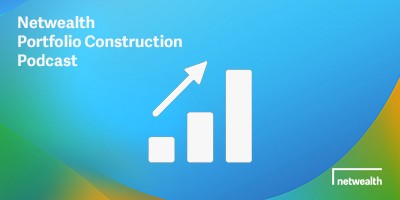Take outs
- A rigorous assessment of the board and management is key
- Risk management enables you to play the defensive half of the investment game
- ESG presents an untapped source of information that can generate excess returns
Amid collapsing bond yields and dropping interest rates, investors are being pushed to seek higher returns.
But investing is more than just picking companies that you feel will generate the greatest profits. A disciplined process for analysing suitable investments is an essential step in portfolio construction.
In its latest webinar, ‘Learn how to navigate the changing equity landscape’, Netwealth spoke to Charlie Lanchester from BlackRock, who provides valuable tips to help you build a successful selection process.
The selection is vast, Charlie says. As such, BlackRock has implemented five quality filters that extend beyond looking up companies and reading analysts’ reports.
These include investigating a company’s management; its debt levels; its ability to make a profit; its competitive advantage; as well as its stance on environmental, social and governance (ESG) issues.
Considerations for company management
When considering a company’s management, it’s important to exercise a rigorous assessment of the board and its managers, Charlie advises.
This must always involve direct contact with key personnel.
Charlie warns that while all companies have a dividend yield at a snapshot in time, it’s far more important that management reinvest back into the business.
“Judging management, how they behave and how they’re structured on remuneration is incredibly important. And, if I had to pick one factor, that would be it,” says Charlie.
ResMed is an example of a company BlackRock was drawn to due to its strong management team over 15 years ago. And it did not disappoint.
Today, ResMed is part of BlackRock’s $20 billion investment pool. Its growth is owed to its consistent re-investment and strong focus on research and development.
Compare managed funds and models
Get the latest research data and commentary to search and compare managed funds and managed account models. See performance data, costs and use powerful filtering tools to identify funds by manager and asset classes.
Where to draw the line on debt levels
Most investors avoid putting their funds in businesses with high debt levels, but BlackRock advises drawing a line and refusing to consider businesses with an EBIT-to-interest cover of less than 4x.
By looking closely at the EBIT-to-interest coverage ratio you’re able to assess a company’s financial durability. Charlie also advises investors to make sure they’re always aware of the operating and financial leverage; this helps in determining a company’s risk and return characteristics.
But what if things don’t go according to plan?
BlackRock is equipped with risk management that enables it to play the defensive half of the investment game.
According to Charlie, risk management is essential, not optional.
Its purpose is to ensure that your investment losses never exceed tolerable boundaries. Established investment companies follow a disciplined practice to safeguard their funds, this can include diversification, valuation, loss prevention and exit strategies.
Show me the profits
Ideally, the company you lend your trust to should demonstrate a history of recurring profits.
However, it’s important to remember that profitability not only depends on having a good profit margin, but also on consistently increasing it.
To find the margin, divide gross profit by the revenue. And, for a good indication of a company’s financial history, investors like to look back at least five years.
Charlie says it’s vital to focus on real earnings – cash flows versus accounting profits. Additionally, he advises avoiding competitive/structural threats, unsustainable margins and financial engineering.
Choosing a company isn't a one-size-fits-all
Superior businesses are never one-size-fits-all, but according to Charlie they should meet certain criteria.
Above all, they need to have a competitive advantage.
But besides ensuring that a company is at the top of its game, investors also need to make sure that this advantage will endure.
Look at whether the company is unique and is focused on staying that way, rather than picking the one that is the biggest.
According to Charlie, ResMed is a great example of a company that has transitioned from a small business to a superior top 100 field leader, and it did so by spending more on research and development than its competitors.
ESG can't be ignored
Environmental, social and governance refers to the three key factors when measuring the sustainability and ethical impact of an investment.
Awareness of ESG is growing, which means you can no longer ignore it.
BlackRock is increasing its focus on sustainability across the board, having recognised that this field presents a largely untapped source of information that can potentially identify investment risks and generate excess returns.
“We’re certainly looking to pick the best companies around ESG, but we exclude those that really fail and throw up a number of red flags,” Charlie explains.
He advises investors to avoid companies that have significantly breached ESG protocols.
Find out more
For more advice on implementing a thorough investment selection process, listen to the Netwealth webinar, Learn how to navigate the changing equity landscape.
Insights
Netwealth portfolio construction podcast
We pick the brains of wealth management experts to uncover insights on the investment areas they are most passionate about.
Exercising discipline when building a portfolio
Learn how to form a disciplined process for analysing investments, an essential step when building a successful portfolio.
What you need to know to wind up a SMSF the right way
Understand the changes to SMSFs and what to consider if you're thinking about winding one up.
Build a resilient portfolio for all stages of the economic cycle
Learn strategies to navigate an evolving world by building your portfolio for any economic condition.
The information in this article is general in nature. Any financial advice it contains is general advice only and has been prepared without taking into account the objectives, financial situation or needs of any particular person. The article content is not intended to be a substitute for professional advice, so before you act on it you should determine its appropriateness having regard to your particular objectives, financial situation and needs, and seek any professional advice you require. Any reference to a particular investment is not a recommendation to buy, sell or hold the investment. The relevant disclosure document should be obtained from Netwealth and considered before deciding whether to acquire, dispose of, or to continue to hold, an investment in any Netwealth product.
This webinar guest is a financial product issuer. Netwealth and the guest have a commercial arrangement that enables investment in products managed by the guest through Netwealth’s platform. Under that arrangement, Netwealth may receive fees from the webinar guest. More information about the fees Netwealth receives is provided in our Financial Services Guide, which is available on our website or by contacting us.




